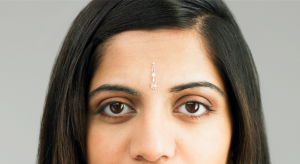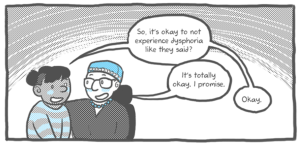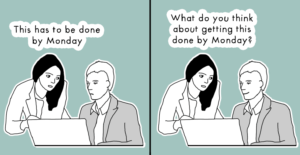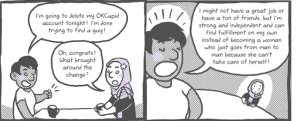“I’m never getting married,” a twenty-year-old me told her mother over coffee and banana walnut cake. “It’s just a piece of paper: an antiquated practice whereby a woman might become a dude’s property.”
It wasn’t just the subjugation aspects of weddings that put me off, though.
They generally seemed like a costly and arguably unnecessary means of declaring one’s femininity. Like, “Look at me in this obscenely expensive princess gown with professional hair and makeup and a handsome prince on my arm. Isn’t it all so grand?”
On my Colombian side of the family, the act of getting married as a woman is also a means of proving one’s success.
To wed (specifically as the gal in a heterosexual relationship) is to achieve aspirational goals instilled in little girls from day one. And to wed a “protector” – an alpha, a financial provider, a physically large presence – might be the biggest sign of achievement yet.
So the notion that women are “supposed” to get married was at the core of my disdain towards the idea for years.
After all, I’ve never much gelled with the premise that one’s assigned gender should dictate the rules by which you live your life. But in 2011, I met the person who would become my long-term partner. And we happened to come from different countries.
Patrick was a citizen of the UK. I was from the US. At the time, I had the opportunity to study abroad in Spain followed by the Czech Republic. But budget-friendly European airlines meant that we could get to each other for as little as fifteen dollars at times.
When it came time for me to move back home, however, the Atlantic Ocean proved a much harsher barrier.
Eventually, I was able to return to England on a student visa, but that only gave me about a year and a half in the country. Upon its expiration, Patrick was able to get a visa for the States. But that only gave him limited time, as well.
Five years into long-distance hell, it seemed clear that our relationship wasn’t going to be easily shattered. It also seemed clear that we couldn’t keep existing in this back-and-forth purgatory.
We’d discussed the possibility of marriage a few times before, and neither of us was particularly bothered. If it meant we could finally have a life free of deadlines and expiration dates, however, then maybe it wasn’t such a bad idea.
That’s how I found myself planning the wedding I once insisted I’d never have.
The whole thing was orchestrated in less than two weeks, so I had to quickly dissect what I really wanted out of a ceremony versus what I’d long been taught to believe I “should” want.
The whole process was an exercise in extremely mindful thinking – in separating autonomy from conditioning and in balancing the needs of my guests alongside my own.
In the end, I didn’t feel remotely governed by my culture, my parents, or even my partner.
And asking myself these six questions while planning helped me achieve that.
1. Who Is This Really For?
My mother had been planning what my wedding would look like from the day I was born.
My curls would be shaped into perfect doll-like ringlets. My dress would put any Disney princess to shame. My husband would be tall, dark, handsome, and wealthy AF. The ceremony would be extravagant and memorable because of it.
Never mind the inexistence of funds for such an affair or the fact that my pansexuality might mean a non-male partner was in my future. She had a vision.
Our vision was pretty different.
We wanted something small and intimate. Something easy, at City Hall perhaps. We didn’t want 100-plus attendees, but rather immediate family only: parents, siblings, and maybe a friend or two. And for the after-party? Well, a simple dinner for everyone would be more than enough. With cake for dessert, obviously.
I knew that was what I wanted, and, yet, as I made the City Hall reservation followed by the dinner one, I had to check in with myself: Was I missing out by not trying to plan something massive and fancy? Would I regret the decision not to invite more people?
When planning such events, it can be incredibly easy to fall into the trap of catering to those around you (or to elementary school textbook interpretations of womanhood and femininity) at the expense of your own wishes.
Just try to remember that the day is yours: yours and whomever you’re marrying. Exercising autonomy is not selfish, but essential.
2. What Clothing Styles Spark the Most Joy in Me?
For a woman or feminine person getting married, pressure to wear the “right” thing can get pretty intense, pretty fast.
When many folks envision weddings, they still conjure up imagery of white ball gowns fit for queens, lace atop of taffeta, “ladylike” up-dos, caked-on makeup, and a display of what the mainstream might still define as “femininity.”
Your femininity might look totally different, though.
Maybe you’re actually quite a masculine dresser, and find more than a bit of empowerment from it. Perhaps your hair is dyed a vibrant shade of aquamarine. You could be a goth, whose black eye shadow/lipstick combination equates to beauty heaven.
Or maybe you’re not much into fashion and beauty at all. You get dressed to be comfortable above all, and wouldn’t know the difference between fast fashion and couture if asked to separate them in a line-up.
Despite the fact that wedding imagery can still harp on tropes of conventional beauty and womanhood, remember that – for better or worse – this is probably going to be a day you remember.
And when reminiscing in a few years, the photos will undoubtedly be much more fun to look back on if you’re in an ensemble that represented your most authentic self.
3. Who Are the Most Important People in My Life?
I never thought I wanted a wedding, let alone a large one.
So, when Patrick and I made the decision to get married, we knew exactly who would be going with us: our parents, my two brothers, and a close family friend.
These were the most important people in our lives and the only ones we really needed around us.
You might have a lot more important humans in your life, and that’s totally okay. But my advice is to try to reject the pressure to invite your fourth cousin removed or your partner’s great, great aunt who they haven’t actually seen in twelve years or your boss’s nephew’s son.
Doing so can get pretty expensive, pretty fast. And even if that’s not an issue, it might also detract from the feeling that the wedding is yours.
When considering guests, it’s also arguably important to consider accessibility. If you want the most important people in your life around you, you’ll want to make sure that your event is something they can afford to attend and that the environment you’re in will cater to everyone’s unique physical abilities.
Doing so will mean that you get to be surrounded by the humans you love while also reminding them that you have their backs.
This will subsequently create a sense of solidarity and community for an occasion that can all too easily feel about glitz, glamour, and little else.
4. What Will These Vows Mean?
Vows – also known as promises you’re making with and to another human being that are meant to signal the kind of relationship you’ll be committing to for – in theory – the rest of your lives. So, um, no pressure there at all.
Although my partner and I ended up opting for the traditional “in sickness and in health” business, these words didn’t just feel like bullshit words.
In the week leading up to the marriage, we had so many conversations about our core values and goals moving forward. We discussed the issues we each care deeply about and reminded ourselves of the overlap.
When it comes to social justice, for instance, we both feel incredibly strongly about women’s, LGBTQIA+, and fat acceptance rights. We want to do our part in combatting sexism, LGBTQIA+ violence, and sizeism through our work – alongside racism, xenophobia, and ableism.
We want to raise our kids to respect all people. We want to be open-minded to the differences we encounter in others, no matter how peculiar they may initially seem to us. We want to raise the daughter we now have in such a way that she never has to doubt her worth or value in this world.
As you’re planning your wedding, try to isolate the things you care most about in this world.
Think about the things you want, the things you want to fight for, and the things you hope to achieve. If your partner is supportive and down for all of the above, chances are you have a pretty strong foundation for this new adventure.
5. Is Thinking About Planning [Insert Aspect of Wedding Here] Causing Anxiety?
Honestly, entering a marriage during a poor state of mental health sounds like a very dangerous idea.
And yet, so many folks seem to sacrifice their psychological wellbeing in the aid of planning the “perfect” event.
The truth is, your “perfect” wedding will likely only be “perfect” if you feel like your best, happiest self during it.
Whether you’re thinking about the cake or the location or whether to have the ceremony in a church or who to invite, try to be mindful of your feelings throughout every decision.
Is the idea of wearing a certain outfit making your skin crawl? Does the thought of seeing that one relative make you want to hurl? Would you rather forgo the whole shitshow and elope in a cave somewhere on the West Coast?
There is absolutely no shame in admitting when you’re starting to feel particularly worrisome or depressed, so remember to check in with yourself and your partner.
And consider that any decision that’s making your anxiety skyrocket might not be the best fit for you.
6. Am I Making This Choice Based on What Women/Femmes Are ‘Supposed’ to Like?
And we arrive at the crux of it all.
This world runs rampant with notions of what women and femmes should or should not do: We should wear makeup, but not too much. We should rock dresses and skirts, but not ones that are too short. We should put our careers on hold in order to marry and start families.
We should not travel alone. We shouldn’t be surprised when we’re harassed or groped. We should be demure and delicate in our movements and words. We should want the princess-like dress and fairytale (heteronormative) wedding. We shouldn’t be too much.
When planning an event that can often feel so rooted in conventional and problematic ideas of womanhood and femininity, prioritizing your needs is of utmost value.
Don’t let anyone tell you what you should or should not want out of your day. Don’t let anyone guilt trip you into choices that will only lessen the beauty of the day. And don’t lose sight of yourself or of the things that make your relationship one worth celebrating.
***
I’ve always been something of a people-pleaser. That is, someone who rejects their own needs in order to cater to the needs and wants of those around them.
While there’s nothing inherently wrong in doing shit for other people, there’s definitely a lot wrong with doing so at the expense of your own identity and desires.
So on my wedding day, I defined my own femininity.
I didn’t pay any mind to what women were “supposed” to want. I didn’t care that my dress wasn’t floor-length or that my makeup was the same makeup I put on every day. I chose to live those hours precisely as I wanted to – and that’s kind of what made it so memorable.
Looking back on my wedding day, it did in fact end up being one of the best days of my life. But that’s not because of how big and fancy and “epic” it was.
Rather, it’s because I am so certain that the day was filled with choices I was making for Patrick and myself.
[do_widget id=’text-101′]
Marie (otherwise known as Miggle) Southard Ospina is a Contributing Writer for Everyday Feminism. She is a freelance journalist and size acceptance activist. Her loves include: writing about plus size fashion, body politics, and fat positivism; watching a lot of sci-fi; and listening to ungodly amounts of folk music. She can be found discussing body image on Good Morning America and StyleLikeU, with writing on Bustle, Refinery29, BuzzFeed, Huffington Post, and Volup2. Read her articles here.
Search our 3000+ articles!
Read our articles about:
Our online racial justice training
Used by hundreds of universities, non-profits, and businesses.
Click to learn more





















